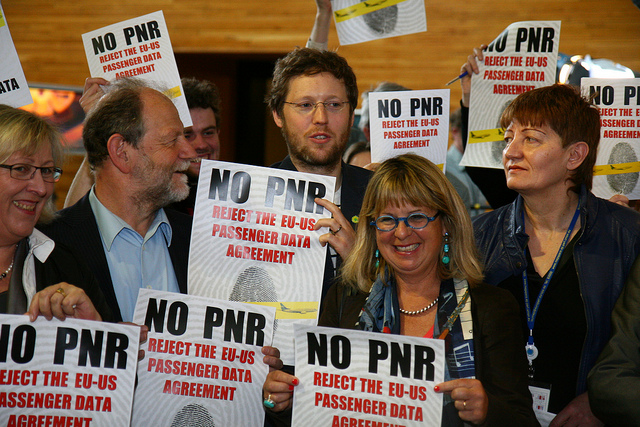There’s been much concern — and, we suspect, much confusion — about what to do about the portions of Arizona’s SB1070 immigration and ID-check law that weren’t struck down by the US Supreme Court in its decision last month in Arizona v. United States.
The portion of the law that remains in place (at least for now) after the Supreme Court decision is exactly the section that we focused on in our analysis of the law when it was first enacted:
For any lawful contact made by a law enforcement official or a law enforcement agency of this state or a law enforcement official or a law enforcement agency of a county, city, town or other political subdivision of this state where reasonable suspicion exists that the person is an alien who is unlawfully present in the United States, a reasonable attempt shall be made, when practicable, to determine the immigration status of the person.
So far as we can tell, the Supreme Court majority (567 U. S. ____, slip opinion at pp. 19-24) reads this section of the law the same way we read it, in three crucial respects:
First, the Supreme Court opinion describes the Arizona law as imposing requirements on state officers to “attempt… to determine” certain facts, in certain circumstances. Nothing in the Supreme Court opinion suggests that SB10170 imposes any obligation on individuals to assist those officers in their “attempt .. to determine” that information, or to carry or provide evidence of, or to answer questions about, their identity or immigration status.
Second, the Supreme Court was unable to find in the text of the law any clear mandate for state officials to detain anyone who would not already be properly subject to detention, or to prolong anyone’s detention, merely in order to facilitate that “attempt … to determine” their immigration status.
Third, the Supreme Court explicltly left open the possibility that any prolongation of detention or delay of release from custody in order to facilitate an immigration check, or as a sanction for inability or unwillingness to supply evidence of identity or immigration status — even if the original detention or custody was lawful — might be unconstitutional. The Supreme Court did not find that this provision is Constitutional, only that it might be Constitutional — depending on how it is interpreted and applied by Arizona state officers and judges — and that it would be premature to find it unconstitutional just yet:
Some who support the challenge to §2(B) argue that, in practice, state officers will be required to delay the release of some detainees for no reason other than to verify their immigration status…. But §2(B) could be read to avoid these concerns. To take one example, a person might be stopped for jaywalking in Tucson and be unable to produce identification. The first sentence of §2(B) instructs officers to make a “reasonable” attempt to verify his immigration status with ICE if there is reasonable suspicion that his presence in the United States is unlawful. The state courts may conclude that, unless the person continues to be suspected of some crime for which he may be detained by state officers, it would not be reasonable to prolong the stop for the immigration inquiry.
To take another example, a person might be held pending release on a charge of driving under the influence of alcohol. As this goes beyond a mere stop, the arrestee (unlike the jaywalker) would appear to be subject to the categorical requirement in the second sentence of §2(B) that “[a]ny person who is arrested shall have the person’s immigration status determined before [he] is released.” State courts may read this as an instruction to initiate a status check every time someone is arrested, or in some subset of those cases, rather than as a command to hold the person until the check is complete no matter the circumstances. Even if the law is read as an instruction to complete a check while the person is in custody, moreover, it is not clear at this stage and on this record that the verification process would result in prolonged detention. However the law is interpreted, if §2(B) only requires state officers to conduct a status check during the course of an authorized, lawful detention or after a detainee has been released, the provision likely would survive pre-emption — at least absent some showing that it has other consequences that are adverse to federal law and its objectives. There is no need in this case to address whether reasonable suspicion of illegal entry or another immigration crime would be a legitimate basis for prolonging a detention, or whether this too would be preempted by federal law….
There is a basic uncertainty about what the law means and how it will be enforced. At this stage, without the benefit of a definitive interpretation from the state courts, it would be inappropriate to assume §2(B) will be construed in a way that creates a conflict with federal law…. This opinion does not foreclose other preemption and constitutional challenges to the law as interpreted and applied after it goes into effect. [slip opinion at pp. 22-24, emphasis added]
This close reading of the law and the Supreme Court opinion makes clear that the next step for opponents of the law is to test how, in practice, the state of Arizona will answer the questions asked by the Supreme Court: Will people in Arizona be detained, will their detentions be prolonged, or will their releases from custody be delayed (without, in each case, some other lawful basis) merely to check their immigration status?
If any of things happen to people in Arizona, the Supreme Court has explicitly left it open for them to bring new Constitutional challenges to those infringements of human rights. And if not, then people in Arizona retain the rights they have always had.
Read More →
